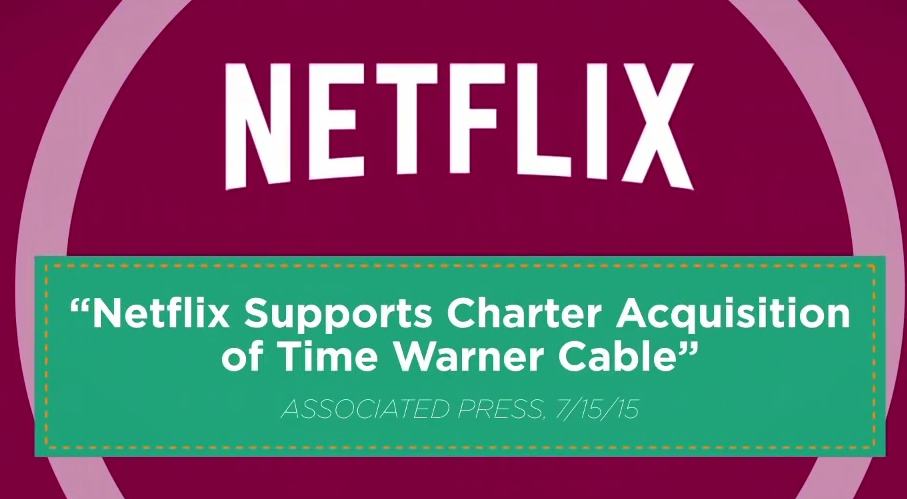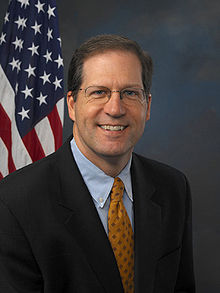
Image from Meet New Charter television ad (Image courtesy: Charter Communications)
Charter Communications has begun advocating for its merger with Time Warner Cable and Bright House Networks in advertisements that note Netflix is a merger supporter.
“Netflix says our upcoming merger with Time Warner Cable is a good thing for you,” said the advertisement, which also promoted an Associated Press story that stated Netflix supports Charter’s acquisition of Time Warner Cable.
The 30-second spots, now run by Time Warner in heavy rotation during local ad inserts on cable networks, promotes Charter’s 60Mbps entry-level broadband tier, 200 HD channels, no contracts or hidden fees, and the company’s claim it offers unlimited broadband access. It does not mention Charter executives have included a three-year expiration date on their commitments, after which the company can do almost anything it pleases.
Charter is hoping to enlist Time Warner Cable and Bright House customers to advocate for their merger’s approval with regulators and has launched a new website called Meet New Charter to promote the deal.
As of early September, the sparse website includes four testimonials — one from Reed Hastings, CEO of Netflix who supports the transaction because Charter promises to voluntarily abide by Net Neutrality policies, won’t attempt to extract fees from Netflix to improve the reach of its service for TWC/Bright House customers, and won’t have usage caps — all deterrents to subscribers using online video.
The other three testimonials come from cable and broadcast programming networks depending on carriage deals with Charter to increase their audience reach.
Meet New Charter wrote of these commitments for Time Warner Cable and Bright House Networks customers:
Faster speeds. Charter’s slowest broadband tier is 60Mbps, which enhances the ability of several people in the same house to watch streaming high-definition video at the same time.
Affordable, faster broadband at lower prices. New Charter will price its new 60Mbps entry level speeds based on Charter’s current model, which is less expensive than TWC and BHN’s comparable offerings. Charter’s pricing model offers nationally uniform pricing with no data caps, no usage-based pricing, no modem fees and no early termination fees.
Committed to Net Neutrality. Charter has long practiced network neutrality and consistently invested in interconnection capacity to avoid network congestion.
Investing in customer care. We are focused on improving New Charter’s customer service and improving our relationships with our customers across our footprint. Over the last three years, Charter has brought back jobs from overseas call centers and hired thousands of people to improve our customer care services. New Charter will also return TWC call center jobs to the United States and will hire and train thousands of new employees for its customer service call centers and field technician operations.
A quicker rollout of advanced technology. We will complete the full digitization of TWC and BHN—freeing up spectrum that will allow for faster broadband speeds and more high-definition channels and On-Demand offerings.
New Charter customers will transition to Charter’s new cloud-based guide. The new guide will offer intuitive search and discovery and will work on old and new set-top boxes, so consumers will get the benefits of the new guide without needing a technician to visit or to pay more for a new box.
To carry out these ambitions, Charter will have to drop analog video channels from the lineup, which means cable television customers will need to lease set-top boxes or other devices for each connected television in their home.
Consumer Reports has also repeatedly rated Charter as one of the country’s worst cable operators (sub req’d.) for customer service, pricing, customer satisfaction, and reliability. In 2015 it rated among the bottom five cable operators nationwide.
[flv]http://www.phillipdampier.com/video/We Are Charter 9-9-15.mp4[/flv]
Charter Communications has begun running this advertisement in heavy rotation on Time Warner Cable systems promoting its merger deal. (30 seconds)


 Subscribe
Subscribe Time Warner Cable’s unlimited local calling area expands to most of Europe today, which means making and receiving calls from across the pond now costs the same as calling your neighbor next door.
Time Warner Cable’s unlimited local calling area expands to most of Europe today, which means making and receiving calls from across the pond now costs the same as calling your neighbor next door. Just like broadband, the cost to transport phone calls around the world has never been cheaper, and rates continue to fall in most other countries, often below 25 cents a minute. The exceptions are usually high-cost service areas, countries where phone tariffs are set artificially high as a revenue generator or to discourage international calling, or places that have to rely on satellite-delivered telephone service. Some examples:
Just like broadband, the cost to transport phone calls around the world has never been cheaper, and rates continue to fall in most other countries, often below 25 cents a minute. The exceptions are usually high-cost service areas, countries where phone tariffs are set artificially high as a revenue generator or to discourage international calling, or places that have to rely on satellite-delivered telephone service. Some examples:



